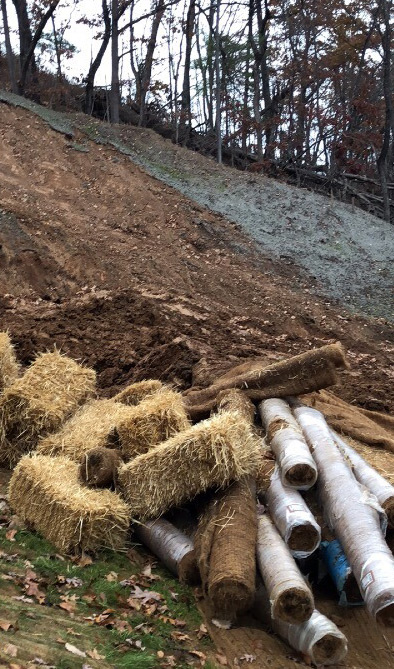Kevin Ridder | December 16, 2019 | No Comments

Heavy rains on Dec. 1 overwhelmed Mountain Valley Pipeline erosion control measures near Elliston, Va. Photo courtesy of Mountain Valley Watch
Pipeline resisters won significant battles in the fight against the fracked-gas Mountain Valley Pipeline in October.
Further delays on the project have caused developers to once more increase the projected cost and push back their expected completion date. Originally expected to be finished in 2018 and cost $3.7 billion, Mountain Valley Pipeline, LLC, has delayed its timeline to the end of 2020 and revised cost estimates to $5.5 billion.

A pile of sediment control materials on the side of a steep hill near the same site on Nov. 27. It is close to a tree-sit where pipeline protesters have blocked construction for more than 450 days. Photo courtesy of Appalachians Against Pipelines
While environmental groups applauded this action, they also criticized FERC for not going far enough. The agency is allowing Mountain Valley Pipeline developers to define for themselves what they consider “stabilization,” meaning the pipeline company could continue to undertake construction activities by claiming they are necessary for stabilization.
Citizen water monitors with the grassroots network Mountain Valley Watch reported seeing increased rates of sedimentation near MVP worksites after heavy rains in early December, raising questions about the effectiveness of the stabilization measures.
FERC’s stop-work order followed a federal appeals court decision to suspend two U.S. Fish and Wildlife Service permits that had allowed Mountain Valley Pipeline developers to harm the habitat of threatened and endangered species. The court decision stems from a legal challenge filed by Sierra Club attorneys on behalf of seven conservation organizations, including Appalachian Voices, the environmental organization that publishes this newspaper.
In October, Mountain Valley Pipeline developers signed a proposed agreement to pay the Commonwealth of Virginia $2.15 million for environmental violations that caused significant erosion and water pollution in 2018. Under the draft settlement, developers would be required to submit to court-ordered and supervised compliance with best management practices as well as the implementation of independent, third-party monitoring. The agreement would resolve a December 2018 lawsuit brought by the state against the pipeline company.
A legal challenge against Dominion Energy’s proposed Buckingham compressor station is moving forward.
On Oct. 29, an attorney for Virginia’s State Air Pollution Control Board admitted that Union Hill is a majority African-American community — bringing into question whether the commonwealth sufficiently evaluated environmental justice concerns when it approved permits for a massive fracked-gas compressor station there for the Atlantic Coast Pipeline. The acknowledgement came during a line of questioning in front of the U.S. Fourth Circuit Court of Appeals over air quality permits issued in January.
University of Virginia anthropologist Lakshmi Fjord led a study released in 2018 which found that within a 1.1-mile radius of this proposed compressor station, more than 83 percent of households are people of color, 33 percent are descendants of freedmen, and the numbers of elderly and the very young are disproportionately higher than other age groups. It is the policy of the Commonwealth of Virginia to ensure that the development of new energy resources does not disproportionately impact disadvantaged or minority communities.
Virginia has previously relied on data provided by the state Department of Environmental Quality that did not recognize Union Hill’s status as an environmental justice community — which residents stated was based on flawed methodology. The board approved the compressor station in January after reviewing the DEQ’s information.
Attorneys representing community group Friends of Buckingham and environmental groups also argued that Virginia never considered using electric motors instead of gas turbines to power the compressor station, which would decrease air pollution.
While the fate of the Atlantic Coast Pipeline and the communities in its path remains uncertain, the day in court was significant for impacted residents. A spokesperson for the Southern Environmental Law Center, a nonprofit law firm representing Friends of Buckingham, stated that a decision on the compressor station air permit is expected in 2020.
“I thought it was great, great, great,” John Laury, an African-American resident who lives about a mile from the site, told the Richmond Times-Dispatch. “They cut through a lot of the rhetoric we have been listening to for approximately five years.”
Construction is still stopped along all of Atlantic Coast’s route, including in the Monongahela National Forest, the Appalachian Trail crossing in the George Washington National Forest, and the Blue Ridge Parkway crossing. In December 2018, the Fourth Circuit Court of Appeals ruled that regulators did not have authority to give Atlantic Coast developers rights-of-way.
In June, the U.S. Solicitor General and Atlantic Coast developers asked the U.S. Supreme Court to hear the case, and the Supreme Court agreed in October. The court scheduled oral arguments for Feb. 24, 2020.
In November, an independent investigation instigated by the Republican-led North Carolina General Assembly found that Democratic Gov. Roy Cooper had misused his authority and influence during the Atlantic Coast Pipeline permitting process to request pipeline developers to create a $57.8 million environmental mitigation and economic development fund. The investigation stated that Cooper did not personally benefit from the agreement.
The Raleigh News & Observer reported that N.C. Republicans suggested pipeline developer Duke Energy had to jump through unnecessary hurdles to obtain permits for the 600-mile fracked-gas pipeline. The governor’s office, on the other hand, told the publication that the investigation was a “sham.”
The investigation reportedly cost North Carolina taxpayers $83,000.
Like this content? Subscribe to The Voice email digests